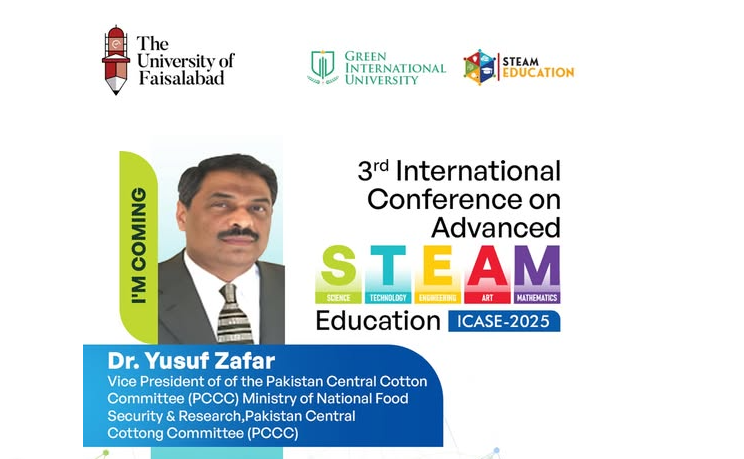Application of an Indigenous, Low-Cost, and Sustainable Floating Treatment Wetlands Technology for Wastewater Treatment and Reuse
Venue 5 – Room 006
Track: Biochemistry and Biotechnology 1
Chair: Dr. Yusuf Zafar, Pakistan Central Cotton Committee
Co-Chair: Dr. Shaista Shafiq, The University of Faisalabad
Introduction
Environmental sustainability has become a critical global priority, especially for countries like Pakistan, where rapid urbanisation, agricultural expansion, and industrial growth have intensified pressure on freshwater ecosystems. In response to these challenges, the STEAM Conference 2025 hosted a dedicated session titled “Application of an Indigenous, Low-Cost, and Sustainable Floating Treatment Wetlands Technology for Wastewater Treatment and Reuse.” Held in Room 006 under the Biochemistry and Biotechnology Track 1, the session explored innovative biotechnology solutions designed to safeguard Pakistan’s water resources through eco-friendly, affordable, and scalable technologies.
Chair Dr. Yusuf Zafar, a leading voice in agricultural biotechnology, emphasized the urgent need for nature-based water purification systems that can serve rural and urban communities alike. Co-Chair Dr. Shaista Shafiq highlighted that Pakistan faces rising water scarcity, and indigenous solutions—especially low-cost floating wetlands—can reshape the country’s wastewater management landscape. Their leadership established a strong foundation for presentations focused on biotechnology, nanotechnology, environmental engineering, and molecular sciences.
Invited Talks and Key Research Contributions
Photodegradation of PFAS – Tackling a Global Environmental Threat
Muhammad Afzal – NIBGE, Faisalabad
In his invited talk, Muhammad Afzal addressed the critical issue of Perfluorooctanoic Acid (PFAS) contamination. PFAS compounds are persistent environmental pollutants found in firefighting foams, industrial effluents, and household products. Afzal presented a novel photodegradation technique, demonstrating how advanced light-based reactions break down PFAS into harmless by-products. His work offers significant potential for integrating photodegradation into floating wetland systems for enhanced remediation.
Climate Finance and Sustainability Compliance
Siti Nor Atika Baharin – Malaya University, Malaysia
Siti provided a comprehensive insight into climate finance frameworks, sustainability policies, and compliance mechanisms for industry and academia. She highlighted Pakistan’s need to align its wastewater treatment innovations with global environmental standards. Her talk outlined pathways to secure international funding, ensuring that sustainable wastewater technologies—such as floating wetlands—receive adequate support.
Bacteria-Based Remediation of Microplastic-Contaminated Soil
Zia ur Rehman – NUST, Pakistan
Zia explored a pioneering microbial approach to address microplastic pollution. His research evaluates specific bacteria capable of biodegrading microplastics, offering new solutions for soil remediation. His findings suggest that integrated systems combining bacterial activity with floating wetlands could be a powerful tool in restoring contaminated environments.
Myco-Synthesised Silver Nanoparticles for Antifungal Protection
Razia Tahseen – NIBGE, Faisalabad
Razia presented her work on fungus-derived silver nanoparticles, which exhibited strong antifungal activity against Aspergillus parasiticus. Using Surface-Enhanced Raman Spectroscopy (SERS) profiling, she demonstrated how these nanoparticles can be used in water purification, plant protection, and biotechnology. This research provides potential enhancements for floating wetlands by integrating nanomaterials for microbial control.
Chloroplast Transformation in Potato – Innovations in Crop Biotechnology
Rizwan Javed – GC University Faisalabad
Rizwan shared breakthroughs in chloroplast transformation technology, a genetic engineering technique that offers improved resistance, yield, and environmental adaptability in crops like potato. This technique directly supports sustainable agriculture, a core element of wastewater reuse systems where treated water is supplied to farmlands.
Nanomaterials for Plant Disease Diagnosis and Control
Faiz Ahmad Joyia – University of Agriculture Faisalabad
Faiz discussed nanotechnology-enabled tools for early disease detection in plants. His work highlighted how nanomaterials can detect pathogens and support disease management in agricultural fields using treated wastewater—showing a direct application in integrated environmental biotechnology.
Germin-like Proteins for Biotic Stress Resistance
Muhammad Shahid – Government College University Faisalabad
Shahid provided molecular insights into Germin-like Proteins (GLPs) in Brassica juncea, explaining their vital role in improving biotic stress tolerance. His research expands the potential of using treated wastewater in agriculture without compromising plant health.
Bioinformatics – From Genomics to Phenomics
Irfan Ali – University of Agriculture Faisalabad
Irfan presented a comprehensive overview of bioinformatics platforms that bridge genomic data with phenotypic traits. His work demonstrated how bioinformatics tools can optimise microbial and plant-based wastewater treatment systems through data-driven analysis.
Emerging Biotechnology Contributions
Laiba Ashfaq – University of Agriculture Faisalabad
Laiba added valuable insights related to emerging trends in biotechnology, emphasizing the importance of integrating computational biology, microbial research, and molecular diagnostics into sustainable wastewater management solutions.
Conclusion
The session on Floating Treatment Wetlands Technology showcased how interdisciplinary biotechnology can provide practical, scalable, and sustainable solutions for Pakistan’s wastewater challenges. Under the visionary guidance of Dr. Yusuf Zafar and Dr. Shaista Shafiq (The University of Faisalabad) researchers presented innovations spanning photodegradation, nanotechnology, microbial remediation, crop biotechnology, and bioinformatics.
The collective message was clear:
Pakistan’s environmental future depends on indigenous, low-cost, and biotechnology-driven wastewater treatment systems that can protect ecosystems and support agricultural reuse.

